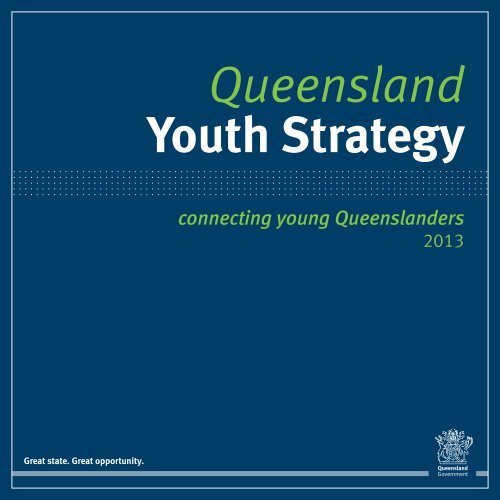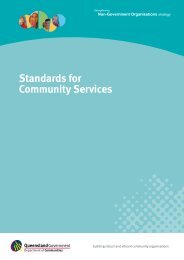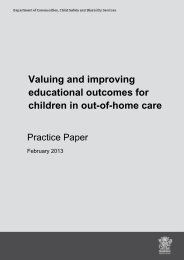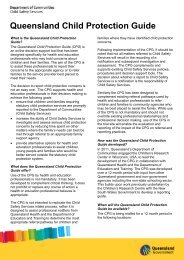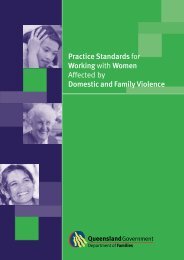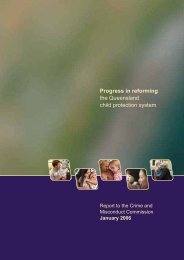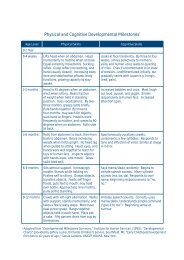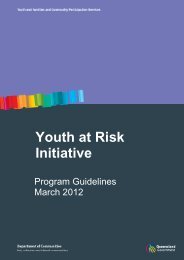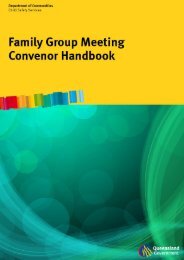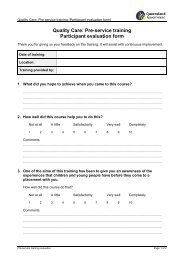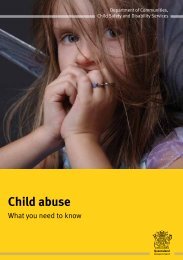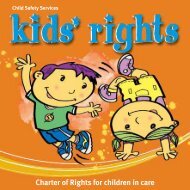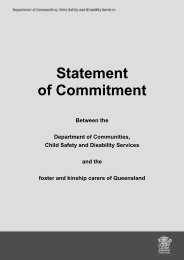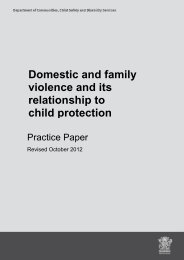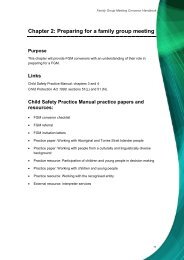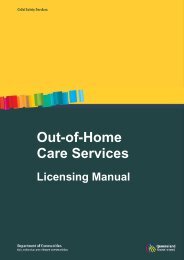Queensland Youth Strategy - Department of Communities, Child ...
Queensland Youth Strategy - Department of Communities, Child ...
Queensland Youth Strategy - Department of Communities, Child ...
Create successful ePaper yourself
Turn your PDF publications into a flip-book with our unique Google optimized e-Paper software.
<strong>Queensland</strong><br />
<strong>Youth</strong> <strong>Strategy</strong><br />
connecting young <strong>Queensland</strong>ers<br />
2013<br />
Great state. Great opportunity.
Foreword<br />
The <strong>Queensland</strong> Government is committed to providing young <strong>Queensland</strong>ers with<br />
the connections and support they need to reach their potential, to be capable and<br />
resilient, to take responsibility for their actions, to look after themselves and those<br />
around them, and to enjoy happy, healthy and productive lives.<br />
That’s what the <strong>Queensland</strong> <strong>Youth</strong> <strong>Strategy</strong> is all about. This plan sets out the<br />
<strong>Queensland</strong> Government’s commitment to delivering the right services, in the right<br />
locations at the right time.<br />
We want to make sure we use emerging technologies to hear what young people have<br />
to say and give them and their families easy access to the information they need.<br />
We will continue to work with communities and the non-government sector to<br />
shape the future <strong>of</strong> services for our young people. By working together we can get<br />
the best results possible for <strong>Queensland</strong>’s youth.<br />
We are excited to launch the <strong>Queensland</strong> <strong>Youth</strong> <strong>Strategy</strong> and look forward to it<br />
helping to deliver great opportunities for young people in this great state<br />
Hon Campbell Newman MP<br />
Premier<br />
Hon Tracy Davis MP<br />
Minister for <strong>Communities</strong>,<br />
<strong>Child</strong> Safety and Disability Services<br />
For more information on the <strong>Queensland</strong> <strong>Youth</strong> <strong>Strategy</strong>, visit the youth website www.qld.gov.au/youth<br />
follow us on twitter @qldyouth, email youth@communities.qld.gov.au or call us on 13 QGOV (7468).<br />
1
Introduction<br />
Every area <strong>of</strong> a young person’s life is connected — their health and wellbeing is linked to how they<br />
achieve at school just as their education is linked to their future success at work and as active and<br />
contributing members <strong>of</strong> society.<br />
The <strong>Queensland</strong> <strong>Youth</strong> <strong>Strategy</strong> aims to<br />
provide connections for young people<br />
and to guide the development and<br />
coordination <strong>of</strong> activities and services<br />
for young people aged 12–21 years.<br />
The <strong>Queensland</strong> <strong>Youth</strong> <strong>Strategy</strong> is for<br />
all young <strong>Queensland</strong>ers — from every<br />
family, from every region <strong>of</strong> the state,<br />
and from every background.<br />
The <strong>Queensland</strong><br />
Government’s vision for<br />
Young People<br />
Our vision is for <strong>Queensland</strong>’s young<br />
people to be:<br />
• connected, taking hold <strong>of</strong><br />
opportunities, and fulfilling their<br />
individual potential<br />
• confident, resilient, responsible<br />
and safe<br />
• good citizens who participate in<br />
their communities.<br />
We need the support <strong>of</strong> all<br />
<strong>Queensland</strong>ers to make this vision a<br />
reality for our young people.<br />
This strategy enables the framework for<br />
the <strong>Queensland</strong> Government’s<br />
direction on engaging, supporting and<br />
working with young people, their<br />
families, with our communities, local<br />
governments and the youth sector as<br />
we know that we can be most effective<br />
when we work together.<br />
To achieve our vision, the strategy<br />
focuses on six action areas for<br />
connecting young people to:<br />
• family, friends and social networks<br />
• education, training and<br />
employment<br />
• health and wellbeing<br />
• volunteering and participation<br />
• supports and services<br />
• arts and culture<br />
Guiding principles<br />
The strategy is guided by a set <strong>of</strong><br />
principles that recognises:<br />
• better connections are made when<br />
young people are valued and seen<br />
as being individual and unique.<br />
A ‘one size fits all’ approach cannot<br />
cater to the diversity <strong>of</strong> young<br />
people’s experiences. Programs<br />
and services must meet the different<br />
life experiences, circumstances and<br />
needs <strong>of</strong> young people<br />
• all young people have strengths<br />
and abilities that, when nurtured<br />
and affirmed, help them achieve<br />
throughout their lives, and be<br />
resilient when there are setbacks<br />
• young people are best supported<br />
when the family as a whole is<br />
strengthened<br />
• young people most <strong>of</strong>ten connect<br />
with information, each other, and<br />
the world around them through the<br />
digital world<br />
The key approaches this strategy takes<br />
to make connections include:<br />
• engaging with young people<br />
through contemporary digital<br />
technologies<br />
• providing practical resources and<br />
services to support a diverse range<br />
<strong>of</strong> young people, particularly those<br />
who need additional support and<br />
guidance to address challenges<br />
• strengthening early intervention<br />
responses for young people before<br />
challenges become problems<br />
• encouraging young people‘s<br />
participation in their communities<br />
• building strong partnerships with<br />
the non-government sector and<br />
local and state government<br />
agencies to foster better<br />
collaborations.<br />
We know the digital world is important for young <strong>Queensland</strong>ers.<br />
That’s why information about services and programs and links to<br />
digital tools and apps for young people will become available<br />
through a dedicated online youth hub — keeping them connected.<br />
2 3
A snapshot — young people in <strong>Queensland</strong><br />
Investing in <strong>Queensland</strong>’s young people<br />
<strong>Queensland</strong> young people are learning, creating, working, caring, contributing and living life in diverse<br />
ways throughout our great state.<br />
The latest census data shows more<br />
than 587,500 young people aged 12 to<br />
21 live in <strong>Queensland</strong> and <strong>of</strong> these:<br />
• 33 per cent live outside<br />
<strong>Queensland</strong>’s major cities<br />
• 2.1 per cent have a disability<br />
• 13.5 per cent were born overseas<br />
• 5.75 per cent are Aboriginal or<br />
Torres Strait Islander<br />
• 9.1 per cent speak a language other<br />
than English at home 1<br />
A recent survey found that 84.4 per cent<br />
<strong>of</strong> 15 to 19 year old <strong>Queensland</strong>ers<br />
lived at home. As a group, they most<br />
valued friends, family, school, and<br />
physical and mental health. They were<br />
concerned about coping with stress,<br />
school/study and body image. The<br />
internet was their primary source <strong>of</strong><br />
information, even ahead <strong>of</strong> parents<br />
and friends. 2<br />
We also know that: 12<br />
• tertiary attendance rose 25 per cent<br />
in the five years to 2011: the<br />
majority <strong>of</strong> the 98,121 students<br />
were full-time<br />
• studying increased from 43.7 per cent<br />
in 2006 to 46.5 per cent in 2011<br />
• almost all used the internet — most<br />
to access social networking sites<br />
• 16.2 per cent did voluntary work,<br />
making up 14.8 per cent <strong>of</strong> all<br />
<strong>Queensland</strong> volunteers 3<br />
The State Government invests in wide-ranging services that assist young <strong>Queensland</strong>ers through<br />
education and training, employment, youth justice, health, transport, community safety, housing,<br />
community services, child safety, disability services, arts, sport and recreation, and the environment.<br />
We want to invest in services that deliver results for our young people.<br />
While most young people grow up in<br />
happy, healthy families, some young<br />
people are doing it tougher than<br />
others. Exposure to risk factors like<br />
family conflict and parental stress,<br />
abuse or neglect, poverty, housing<br />
stress, unemployment, disengagement<br />
from school, teen pregnancy and drug<br />
and alcohol misuse increases their<br />
vulnerability and can dim their hopes.<br />
The <strong>Queensland</strong> Government’s<br />
investment direction is on people,<br />
programs and systems: <strong>of</strong>fering the<br />
right services in the right location to<br />
the young people who need our help.<br />
The Better Services for <strong>Queensland</strong>ers<br />
plan 4 , the state’s response to the<br />
<strong>Queensland</strong> Commission <strong>of</strong> Audit, is a<br />
key driver to change the way we invest<br />
in services.<br />
For young people, this means<br />
services that:<br />
• make a positive difference in their<br />
lives, encourage smart choices, and<br />
enable connections and actions to<br />
make the most <strong>of</strong> opportunities<br />
• respond to their needs and<br />
aspirations — and are readily<br />
accessible, particularly for those<br />
at risk<br />
• focus on building their skills and<br />
knowledge<br />
• provide help earlier, before a<br />
problem gets too big and support<br />
responsibility, resilience and<br />
self-reliance<br />
One <strong>of</strong> the ways in which we will ensure<br />
the right services are delivered in the<br />
right location to the right young people<br />
is through the <strong>Queensland</strong> Government<br />
investing its youth program funding in<br />
ways that will:<br />
• achieve better value for money<br />
• rebalance investment toward<br />
prevention and early intervention<br />
• enable greater consumer choice<br />
• make a difference to consumers<br />
• reduce red tape<br />
• partner with and leverage the<br />
investment, innovation and<br />
enterprise <strong>of</strong> the community and<br />
corporate sectors<br />
1 All statistics are approximated.<br />
2 Mission Australia’s <strong>Youth</strong> Survey 2012<br />
(2,222 young people surveyed)<br />
3 In the twelve months prior to the 2011 Census<br />
4 www.treasury.qld.gov.au/coa-response/betterservices.shtml<br />
4 5
Areas <strong>of</strong> connection<br />
The <strong>Queensland</strong> <strong>Youth</strong> <strong>Strategy</strong> will deliver six areas <strong>of</strong> connection to benefit young <strong>Queensland</strong>ers.<br />
Areas <strong>of</strong> connection Government action areas Benefits for young people<br />
1<br />
Families, friends<br />
and social<br />
networks<br />
2 Education,<br />
training and<br />
employment<br />
3<br />
Health and<br />
wellbeing<br />
• Information for young people<br />
• Information for families and parents<br />
• <strong>Youth</strong> support<br />
• Schools and learning environment<br />
• Training services<br />
• Employment services<br />
• Sport and recreation activities<br />
• Hospitals and health services<br />
• Mental health services<br />
• <strong>Youth</strong> justice responses<br />
• Safe, caring family environment<br />
• Parents supported to develop skills in parenting<br />
young people<br />
• Better access to information and support networks<br />
• Effective learning environments<br />
• Educational attainment and achievement<br />
• Work skills that are in demand<br />
• Job opportunities<br />
• Improved physical health and wellbeing<br />
• Good mental health<br />
• Safer communities<br />
1<br />
Connecting<br />
to<br />
families, friends and<br />
social networks<br />
What is the Government’s<br />
approach to connecting young<br />
people with family, friends and<br />
social networks?<br />
The <strong>Queensland</strong> Government<br />
recognises that family and friends are<br />
the most important influence in a<br />
young person’s life. Families influence<br />
a young person’s self-esteem, wellbeing<br />
and safety which in turn affect school<br />
performance and later, participation as<br />
active citizens in our society.<br />
4<br />
5<br />
Volunteering and<br />
participation<br />
Supports and<br />
services<br />
• <strong>Youth</strong> leadership programs<br />
• <strong>Youth</strong> volunteering<br />
• Information for young people about<br />
youth services<br />
• <strong>Youth</strong> support<br />
• Support for young people at risk <strong>of</strong><br />
homelessness<br />
• Art and cultural activities<br />
6 Arts and culture • Online workshops and programs<br />
• Awards and festivals<br />
• Active in community and civic life<br />
• Develop decision-making and leadership skills<br />
• Increased engagement<br />
• Access contemporary supports and services<br />
• Help to achieve personal goals<br />
• Safe, stable accommodation (for those unable to<br />
live at home)<br />
• Participate in creative arts and culture<br />
• Celebrate and be recognised for creative<br />
contributions<br />
• Develop skills to join in and enjoy arts and culture<br />
For some young people the transition<br />
from adolescence to adulthood is<br />
challenging. Families will be able to<br />
easily access information and advice,<br />
including apps to prepare young people<br />
for this transition, wherever they live.<br />
The <strong>Queensland</strong> Government will provide<br />
early intervention and support for those<br />
families who need it. Where young<br />
people are at risk <strong>of</strong> harm in their family,<br />
funded services will work with them<br />
and their family to keep them safe.<br />
6 7
Areas <strong>of</strong> connection<br />
How will we know we’re<br />
connecting young people to<br />
family, friends and social<br />
networks?<br />
• Young people and families will<br />
be able to more readily find the<br />
information they need to<br />
support them.<br />
• Fewer young people will experience<br />
homelessness.<br />
• More parents needing information<br />
or assistance with parenting will get<br />
the help they need.<br />
Further information on the actions<br />
Government is taking to connect young<br />
people with family, friends and social<br />
networks can be found at “Connection<br />
1” in the Appendix.<br />
2<br />
Connecting<br />
to<br />
education, training<br />
and employment<br />
What is the Government’s<br />
approach to connecting young<br />
people with education, training<br />
and employment?<br />
We want young people to be better<br />
informed about their study and job<br />
opportunities. The longer young people<br />
can be engaged with school and<br />
learning, the better start they have in<br />
entering the workforce and building a<br />
secure future.<br />
The <strong>Queensland</strong> Government is<br />
committed to providing young people<br />
with vocational information, training<br />
opportunities and pathways to jobs.<br />
How will we know we’re<br />
connecting young people to<br />
education, training and<br />
employment?<br />
• More young people will attain Year<br />
12 or equivalent.<br />
• More young people will participate<br />
in training or further study.<br />
• More young people will be working.<br />
Further information on the actions<br />
Government is taking to connect young<br />
people to education, training and<br />
employment can be found at<br />
“Connection 2” in the Appendix.<br />
3<br />
Connecting<br />
to health<br />
and wellbeing<br />
What is the Government’s<br />
approach to connecting young<br />
people with health and wellbeing?<br />
Fitness, healthy eating and body image<br />
are critical for young people’s good<br />
health, now and in later life. Young<br />
<strong>Queensland</strong>ers also need access to<br />
supports and services that promote<br />
positive mental health.<br />
Young people should be able to<br />
participate in both their local<br />
communities and in the digital world,<br />
knowing they are safe from anti-social<br />
behaviour, abuse and violence.<br />
Equally, the <strong>Queensland</strong> Government<br />
believes young people must be held<br />
accountable for their actions when they<br />
have committed a crime and they<br />
should receive assistance to help make<br />
positive changes in their lives.<br />
How will we know we’re<br />
connecting young people to<br />
health and wellbeing?<br />
• More young people will report<br />
better mental health.<br />
• More young people will feel safe.<br />
• More young people will act<br />
responsibly and lawfully.<br />
Further information on the actions<br />
government is taking to improve the<br />
health and wellbeing <strong>of</strong> young people<br />
in <strong>Queensland</strong> can be found at<br />
“Connection 3” in the Appendix.<br />
4<br />
Connecting<br />
to<br />
volunteering and<br />
participation<br />
What is the Government’s<br />
approach to connecting young<br />
people to volunteering and<br />
participation?<br />
Getting young people involved is good<br />
for them and good for <strong>Queensland</strong>. By<br />
participating in volunteering, sport and<br />
other community activities young people<br />
develop their character and resilience,<br />
as well as decision-making and<br />
leadership skills and make an important<br />
contribution to their community.<br />
A young person’s participation and<br />
achievement at school, training or<br />
university impacts on their long-term<br />
economic and social wellbeing.<br />
• More young people will be active.<br />
• More young people will report<br />
improved physical health.<br />
8 9
Areas <strong>of</strong> connection<br />
Volunteering gives young people the<br />
opportunity to have fun and acquire<br />
new skills. It can also be an important<br />
path to employment.<br />
The State Government believes young<br />
<strong>Queensland</strong>ers are responsible for<br />
making the most <strong>of</strong> the opportunities in<br />
their community, respecting others and<br />
voicing their opinions constructively on<br />
issues that matter to them. We need to<br />
provide access to contemporary digital<br />
channels to help this happen effectively.<br />
How will we know we’re<br />
connecting young people to<br />
participation and volunteering?<br />
• More young people will volunteer in<br />
their communities.<br />
• More young people will take on<br />
leadership roles.<br />
• More young people will have their<br />
voices heard.<br />
Further information on the actions<br />
Government is taking to connect young<br />
people to volunteering and<br />
participation can be found at<br />
“Connection 4” in the Appendix.<br />
5<br />
Connecting<br />
to<br />
supports and services<br />
What is the Government’s<br />
approach to connecting young<br />
people to supports and<br />
services?<br />
Some young people need extra help.<br />
We will provide them with access to<br />
high quality, effective support services<br />
that meet their individual needs. For<br />
example, those young <strong>Queensland</strong>ers<br />
who cannot live at home will be<br />
assisted to access safe, stable<br />
accommodation. <strong>Youth</strong> services will<br />
work with young people in ways that<br />
make a difference — by assisting them<br />
to achieve their personal goals and stay<br />
connected with their family and<br />
community, as well as with education,<br />
training and employment<br />
We will make sure young people have<br />
information about youth services in<br />
ways that will work for them.<br />
How will we know we’re<br />
connecting young people to<br />
supports and services?<br />
• More young people will access the<br />
right services at the right time.<br />
• More young people will have their<br />
say on issues that affect them.<br />
• <strong>Youth</strong> services will be more<br />
transparent and accountable: there<br />
will be less red tape.<br />
Further information on the actions<br />
Government is taking to connect young<br />
people to supports and services can be<br />
found at “Connection 5” in the<br />
Appendix.<br />
6<br />
Connecting<br />
to arts<br />
and culture<br />
What is the Government’s<br />
approach to connecting young<br />
people to arts and culture?<br />
Young people’s participation in arts,<br />
culture and creative expression has a<br />
range <strong>of</strong> benefits for them and their<br />
communities.<br />
The transmission <strong>of</strong> culture across<br />
generations is vital for all young people,<br />
including young Aboriginal and Torres<br />
Strait Islander people and young people<br />
from culturally diverse backgrounds.<br />
Participating in cultural activities<br />
inspires pride in heritage and identity.<br />
These factors contribute to the<br />
development <strong>of</strong> resilient, healthy and<br />
socially connected young people.<br />
Engagement in the arts provides<br />
positive opportunities for young people<br />
to creatively express themselves and<br />
their culture. We want to ensure that<br />
young people’s contributions to the<br />
arts in <strong>Queensland</strong> are recognised and<br />
supported.<br />
How will we know that we’re<br />
connecting young people to arts<br />
and culture?<br />
• Young people will join in cultural<br />
events and activities.<br />
• More young <strong>Queensland</strong>ers will be<br />
recognised for their creative<br />
achievements.<br />
Further information on the actions<br />
Government is taking to connect young<br />
people to arts and culture can be<br />
found at “Connection 6” in the Appendix.<br />
10 11
Appendix: Action Plan 2013–2014<br />
1. Connecting to families, friends and social networks<br />
Introduction<br />
The <strong>Queensland</strong> <strong>Youth</strong> <strong>Strategy</strong> aims to<br />
guide the development, support and<br />
connectedness <strong>of</strong> young people in<br />
<strong>Queensland</strong> so that they can help<br />
shape their own economic and social<br />
futures, and those <strong>of</strong> their communities<br />
and the world around them. The<br />
strategy is for young <strong>Queensland</strong>ers<br />
from every family, from every region <strong>of</strong><br />
the state and from every background.<br />
This Action Plan, which will be updated<br />
annually, outlines in practical terms<br />
what the Government will do to achieve<br />
the objectives <strong>of</strong> the strategy and<br />
connect young people to:<br />
• family, friends and social networks<br />
• education, training and<br />
employment<br />
• health and wellbeing<br />
• volunteering and participation<br />
• supports and services<br />
• arts and culture.<br />
The <strong>Queensland</strong> Government recognises that family is the most important influence in a young person’s life. Families influence<br />
a young person’s sense <strong>of</strong> self-esteem, wellbeing and safety which in turn affect school performance and later participation as<br />
active citizens in our society.<br />
What will Government do to connect young people to family, friends and social networks in <strong>Queensland</strong>?<br />
Actions<br />
A wide range <strong>of</strong> non-government support services including neighbourhood centres will<br />
be funded to assist young people or families address issues that impact on their<br />
personal, social or emotional wellbeing and safety.<br />
Kids Helpline will continue to be funded to provide a free 24-hour counselling service for<br />
kids and young people aged 5–25 years.<br />
The Regional <strong>Child</strong>ren’s Telephone Counselling initiative will continue to provide 24/7<br />
telephone counselling support for children and young people up to 18 years from regional<br />
areas across <strong>Queensland</strong> on issues including peer pressure, sexual health, social<br />
isolation, suicide, bullying, safety and abuse.<br />
Parentline will continue to provide phone counselling and support services for<br />
<strong>Queensland</strong> parents and primary caregivers to nurture positive, caring relationships<br />
between parents, children and teenagers.<br />
A range <strong>of</strong> targeted services for young people who experience complex challenges and/or<br />
who are vulnerable and at risk will be provided.<br />
Up to 240 young people with a high needs disability, aged 16 to 25, and their carers, will<br />
get extra respite hours through an investment <strong>of</strong> $22 million over four years.<br />
Post-school funding will continue to assist school leavers with disabilities plan for the future.<br />
A two-year, $4 million intensive family intervention program will be trialled, giving about<br />
300 families practical support, advice helplines and information.<br />
A $3.2 million package <strong>of</strong> initiatives, increasing to $3.7 million in 2014–15, will<br />
strengthen the network <strong>of</strong> supports and services designed to provide more coordinated<br />
care for children and their families across <strong>Queensland</strong>.<br />
Parent Connect will provide assistance to parents, including young parents, <strong>of</strong> newborns<br />
with a disability.<br />
Agency<br />
<strong>Department</strong> <strong>of</strong> <strong>Communities</strong>,<br />
<strong>Child</strong> Safety and Disability<br />
Services<br />
12<br />
13
1. Connecting to families, friends and social networks (continued)<br />
2. Connecting to education, training and employment<br />
Actions<br />
Community organisations will provide accommodation and support services for families<br />
and individuals experiencing homelessness or at risk <strong>of</strong> homelessness.<br />
$28.9M over four years has been committed to enhancing Maternal and <strong>Child</strong> Health<br />
Services to provide additional access to home visits and community clinics in the first<br />
12 months following birth.<br />
A Health Visiting Program for families, including young parents, with children up to three<br />
years <strong>of</strong> age, will continue under the Helping Out Families program, through the Gold<br />
Coast Hospital and Health Service and <strong>Child</strong>ren’s Health <strong>Queensland</strong>.<br />
<strong>Child</strong> and <strong>Youth</strong> Community Health Services including general child health consultations,<br />
parenting services including young parents programs, Triple P Positive Parenting<br />
education, allied health and nutrition and diversity programs, will continue for children<br />
and their families at community locations.<br />
Information about services and programs and links to digital tools and apps for young<br />
people, their family and friends will be available through www.qld.gov.au/youth.<br />
Agency<br />
<strong>Department</strong> <strong>of</strong> <strong>Communities</strong>,<br />
<strong>Child</strong> Safety and Disability<br />
Services and <strong>Department</strong> <strong>of</strong><br />
Housing and Public Works<br />
<strong>Department</strong> <strong>of</strong> Health<br />
All agencies, informed by the<br />
Office for <strong>Youth</strong>, <strong>Department</strong> <strong>of</strong><br />
<strong>Communities</strong>, <strong>Child</strong> Safety and<br />
Disability Services<br />
A young person’s participation and achievement at school, training or university links to their long-term economic and social<br />
wellbeing. We want young people to be better informed about their study and job opportunities.<br />
What will Government do to connect young people to education, training and employment?<br />
Actions<br />
<strong>Queensland</strong> students will benefit from enhanced learning opportunities through<br />
investment <strong>of</strong> $328.2 million in state schools over four years and an additional<br />
$293.8 million in recurrent funding and $81.3 million towards non-state schools to<br />
move Year 7 to secondary school from 2015.<br />
Young adolescents transitioning from primary to secondary school will get more support<br />
for their academic, social and emotional needs.<br />
Remaining learning areas <strong>of</strong> Prep to 10 Australian Curriculum will be implemented.<br />
The <strong>Queensland</strong> Government will work with universities to widen participation <strong>of</strong> low<br />
socio-economic and Indigenous people in tertiary study.<br />
The Solid partners Solid futures plan 2013–16 will ensure Aboriginal and Torres Strait<br />
Islander <strong>Queensland</strong>ers are supported and engaged in learning from early childhood<br />
education and care, through to schooling, training, tertiary education and employment.<br />
The Great Skills Real Opportunities five year plan to revitalise <strong>Queensland</strong>’s VET sector,<br />
will support young <strong>Queensland</strong>ers to access and complete the skills training they need to<br />
get a job.<br />
The VET in Schools initiative will deliver better alignment to employment pathways for<br />
young people in their senior phase <strong>of</strong> learning.<br />
Local government traineeships will be <strong>of</strong>fered in flood-affected communities, creating new<br />
employment opportunities for 15 to 24 year olds. Local government authorities will<br />
receive wage subsidies for 120 new traineeships.<br />
The <strong>Youth</strong> Support Coordinator initiative through funding <strong>of</strong> $9.6 million annually, will<br />
support at-risk young people to stay at school, re-engage in education or training or<br />
transition to employment.<br />
500 scholarships <strong>of</strong> up to $20,000 will be made available to women leaving school,<br />
returning to study or changing careers in specified male-dominated fields <strong>of</strong> study<br />
experiencing skills shortages.<br />
Agency<br />
<strong>Department</strong> <strong>of</strong> Education,<br />
Training and Employment<br />
14 15
2. Connecting to education, training and employment (continued) 2. Connecting to education, training and employment (continued)<br />
Actions<br />
Agency<br />
Actions<br />
Agency<br />
The Gateway to Industry Schools Program will continue to help young people transition<br />
from school to work while completing school and gaining formal qualifications.<br />
The <strong>Queensland</strong> Minerals and Energy Academy, assisting young people to prepare for<br />
careers in the resources sector, will be supported.<br />
Funding <strong>of</strong> $1 million over four years will provide school chaplaincy services to support<br />
young people.<br />
Funding <strong>of</strong> up to $86 million will provide 10,000 additional apprenticeships over six years<br />
to meet <strong>Queensland</strong>’s anticipated skills shortage.<br />
The QSchools smartphone app will provide a convenient way for people to receive<br />
up-to-the minute information from and about schools. This app will be particularly useful<br />
to parents who have students in different schools, as the app manages updates from<br />
multiple schools in a single view.<br />
<strong>Queensland</strong> will continue to support the Take the Stand app, developed by all Australian<br />
education authorities, to create safe and supportive school environments that are free<br />
from bullying, harassment and violence.<br />
The Certificate 3 Guarantee will give <strong>Queensland</strong>ers access to a government subsidised<br />
training place up to and including their first certificate III level qualification in priority<br />
training areas and will give every year 12 graduate access to fee-free priority training<br />
courses within one year <strong>of</strong> leaving school.<br />
The Community Learning Program, with $47 million over five years, will provide additional<br />
support for <strong>Queensland</strong>ers with diverse needs, including young people, to gain a<br />
qualification.<br />
Funding <strong>of</strong> $3 million will improve training pathways for young people into agricultural<br />
sciences and economics.<br />
<strong>Department</strong> <strong>of</strong> Education,<br />
Training and Employment<br />
Funded programs will enable local businesses to tap into contemporary skills and<br />
workforce development strategies that will lift the productive capacity <strong>of</strong> their businesses<br />
and, in turn, the region.<br />
The School to Industry Partnership Program, developing and strengthening partnerships<br />
between rural industry and schools, including engagement <strong>of</strong> producers through the<br />
AgForce Rural Champion Volunteer Program, will continue.<br />
The web-based learning management system Rural Skills Online will continue in<br />
<strong>Queensland</strong> schools.<br />
National Science Week will be supported, acknowledging and celebrating scientific<br />
achievements and encouraging interest in science, particularly among school students.<br />
A catalogue <strong>of</strong> science, technology, engineering and maths (STEM) education programs<br />
and activities operating across <strong>Queensland</strong> will be collated and maintained.<br />
GroupX will deliver its I Choose Technology activities, which are dedicated to promoting<br />
ICT tertiary studies and careers, primarily through high school visits and career expos.<br />
<strong>Queensland</strong> Museum’s statewide network will provide programs for young people<br />
including curriculum-based education activities, workshops and school-based<br />
apprenticeships, encouraging participation and attendance.<br />
<strong>Queensland</strong> Museum will provide young people in schools access to object-based<br />
learning using museum collections through a statewide loan service <strong>of</strong> kits aligned to<br />
national curriculum.<br />
Science students will be mentored through internships at the Museum <strong>of</strong> Tropical<br />
<strong>Queensland</strong> in Townsville.<br />
State Library <strong>of</strong> <strong>Queensland</strong> will provide onsite and online public programs and learning<br />
opportunities for young people, including student research support, online literature<br />
festivals and literacy workshops and programs.<br />
Students in tourism will be part <strong>of</strong> a workshop informing the industry’s 20 year<br />
development plan and will be represented at the annual DestinationQ tourism forum.<br />
<strong>Department</strong> <strong>of</strong> Agriculture,<br />
Fisheries and Forestry and<br />
AgriFood Skills Australia<br />
<strong>Department</strong> <strong>of</strong> Agriculture,<br />
Fisheries and Forestry, and<br />
Rural Skills <strong>Queensland</strong><br />
<strong>Department</strong> <strong>of</strong> Science,<br />
Information Technology,<br />
Innovation and the Arts<br />
The Agribusiness Gateway Schools program, available in 22 secondary schools, will<br />
continue to successfully transition participants from school into further education,<br />
training, and/or employment in the agribusiness sector.<br />
The National Regional Initiative—Western Downs, empowering local businesses and<br />
community leaders to take charge <strong>of</strong> their local skills agenda, will be delivered.<br />
<strong>Department</strong> <strong>of</strong> Agriculture,<br />
Fisheries and Forestry<br />
<strong>Department</strong> <strong>of</strong> Tourism, Major<br />
Events, Small Business and the<br />
Commonwealth Games<br />
16 17
3. Connecting to health and wellbeing<br />
3. Connecting to health and wellbeing (continued)<br />
Fitness, healthy eating, mental wellbeing and healthy body image are critical for young people’s good health, now and in later<br />
life. Young people should be safe in their communities. They should be able to participate in both their physical communities<br />
and in the digital world, knowing they are safe from anti-social behaviour, abuse and violence.<br />
What will Government do to improve the health and wellbeing <strong>of</strong> young people in <strong>Queensland</strong>?<br />
Actions<br />
The $47.8 million Get in the Game initiative will support sport and recreation at the<br />
grassroots level, encouraging greater participation <strong>of</strong> children and young people through:<br />
• Get Started program, which involves giving eligible young people aged 5 to 17 the<br />
opportunity to join a sport and recreation club by providing up to $150 for<br />
membership/participation fees.<br />
• Get Going program, which encourages more young people to join clubs by giving clubs<br />
one-<strong>of</strong>f grants up to $10,000 for equipment, training and activities.<br />
• Get Playing program, which provides up to $100,000 in funding to assist local sport<br />
and recreation organisations with facility development.<br />
The Young Athlete Assistance Program will continue to assist athletes under the age <strong>of</strong> 18<br />
with travel and accommodation costs to attend championship events.<br />
The Play by the Rules initiative, which aims to make sport inclusive, safe and fair for all<br />
involved, will be promoted.<br />
One-<strong>of</strong>f commitment funding for sport and recreation organisations for facility<br />
development, to increase participation opportunities for young people and other groups.<br />
Healthy eating programs will be promoted under the National Partnership Agreement on<br />
Preventative Health through clubs with junior members across <strong>Queensland</strong>.<br />
A framework for improved coordination <strong>of</strong> current and future initiatives will advance youth<br />
participation in sport and recreation, including a strategy for closer ties with schools.<br />
The Indigenous Community Sport and Recreation Program and the Deadly Sports Program<br />
will continue.<br />
Counselling services for child victims <strong>of</strong> abuse will receive a $1 million boost over four<br />
years. Non-government counsellors will deliver additional services for victims <strong>of</strong> child<br />
abuse and sexual assault.<br />
Agency<br />
<strong>Department</strong> <strong>of</strong> National Parks,<br />
Recreation, Sport and Racing<br />
<strong>Department</strong> <strong>of</strong> <strong>Communities</strong>,<br />
<strong>Child</strong> Safety and Disability<br />
Services<br />
Actions<br />
The Safer Schoolies Initiative will continue to respond to the large number <strong>of</strong> school<br />
leavers who attend key Schoolies locations in <strong>Queensland</strong>, working in partnership with<br />
community organisations and councils to improve schoolies’ safety and reduce the<br />
potential impact on communities.<br />
A multimedia presentation package for use in schools will be part <strong>of</strong> an annual Safer<br />
Schoolies communication strategy to encourage school leavers to adopt safe behaviours<br />
during their end-<strong>of</strong>-school holidays.<br />
Extension <strong>of</strong> the drinksafe precinct trials, to keep young people safe when they are having<br />
fun and celebrating with friends, will be evaluated.<br />
Boot camps, incorporating structured activities and support designed to deter youths from<br />
re<strong>of</strong>fending, will receive $5.5 million and be trialled over two years.<br />
A blueprint for the future <strong>of</strong> youth justice, seeking to reduce youth <strong>of</strong>fending and build<br />
safer communities, will be developed. This will include the expansion <strong>of</strong> the boot camp<br />
program, review <strong>of</strong> the <strong>Youth</strong> Justice Act 1992, development <strong>of</strong> more effective sentencing<br />
options, better managing demand for youth justice services, addressing the causes <strong>of</strong><br />
crime and improving youth detention services.<br />
School education programs will receive $1 million over four years to teach young people how<br />
to protect themselves and their friends and to report suspected abuse and sexual assault.<br />
Key community stakeholders, including youth groups and services, will be consulted as<br />
part <strong>of</strong> the review <strong>of</strong> alcohol management plans in discrete Indigenous communities.<br />
Officers-in-charge, school-based police <strong>of</strong>ficers and Adopt-a-Cop will continue work with<br />
schools, P&Cs and local communities to stimulate school and community-based policing.<br />
<strong>Queensland</strong>’s 54 Police Citizens <strong>Youth</strong> Clubs (PCYCs) will work statewide to deliver a range<br />
<strong>of</strong> crime-prevention and youth development initiatives including the PCYC Emergency<br />
Services Cadets Program.<br />
The Sun Effects Booth app will continue to be available for free through the iTunes store.<br />
The app involves a quiz about behaviours in the sun, uploading a photo <strong>of</strong> the face and a<br />
tailored simulated image <strong>of</strong> how the face might look in the future. The app also provides<br />
information about the five recommended sun protection methods and allows the user to<br />
check the daily UV Index for their location.<br />
Agency<br />
<strong>Department</strong> <strong>of</strong> <strong>Communities</strong>,<br />
<strong>Child</strong> Safety and Disability<br />
Services<br />
<strong>Department</strong> <strong>of</strong> Justice and<br />
Attorney-General<br />
<strong>Department</strong> <strong>of</strong> Education,<br />
Training and Employment<br />
<strong>Department</strong> <strong>of</strong> Aboriginal and<br />
Torres Strait Islander and<br />
Multicultural Affairs<br />
<strong>Queensland</strong> Police Service<br />
PCYC in partnership with<br />
<strong>Queensland</strong> Police Service<br />
<strong>Department</strong> <strong>of</strong> Health<br />
18 19
3. Connecting to health and wellbeing (continued)<br />
4. Connecting to volunteering and participation<br />
Actions<br />
School-based youth health nurses in state secondary schools will continue to provide<br />
services including individual health consultations, group health education and whole-<strong>of</strong>school<br />
health promotion.<br />
Indigenous youth health workers' knowledge and skills will be developed under the<br />
National Partnership Agreement on Indigenous Early <strong>Child</strong>hood Development.<br />
Access for young Aboriginal and Torres Strait Islander people to sexual and reproductive<br />
health services will be increased under the National Partnership Agreement on Indigenous<br />
Early <strong>Child</strong>hood Development.<br />
A mental health transition service for 8 to 18 year olds with early onset mental illness and<br />
complex care needs from <strong>Child</strong> and <strong>Youth</strong> Mental Health Services to clinical, community<br />
and cultural support services in their communities will continue to be implemented under<br />
Making Tracks.<br />
The Regional Network <strong>of</strong> Indigenous Alcohol, Tobacco and other Drugs (ATODS)<br />
<strong>Youth</strong> Program will continue to provide a focused treatment model for Aboriginal and<br />
Torres Strait Islander young people with substance misuse problems in key locations under<br />
Making Tracks.<br />
A program to improve access to primary health care for young Aboriginal and Torres Strait<br />
Islander people at the Brisbane <strong>Youth</strong> Detention Centre will be implemented under Making<br />
Tracks.<br />
Mental health and substance use transition services will be delivered to Aboriginal and<br />
Torres Strait Islander clients leaving the Brisbane <strong>Youth</strong> Detention Centre.<br />
The newly established <strong>Queensland</strong> Mental Health Commission will include young people<br />
as a priority group.<br />
Information, safety tips and updates about the weather and natural disasters will be<br />
provided to young people through a range <strong>of</strong> online tools including Facebook, Twitter,<br />
YouTube, Pinterest, blogs and Vine.<br />
The <strong>Youth</strong>ful Prisoner Program, for 18 to 20 year old <strong>of</strong>fenders at the Woodford<br />
Correctional Centre, will continue.<br />
A case management model targeted at young <strong>of</strong>fenders between 17 and 21 years <strong>of</strong> age<br />
will be developed.<br />
Agency<br />
<strong>Department</strong> <strong>of</strong> Health<br />
<strong>Department</strong> <strong>of</strong> Community<br />
Safety<br />
Young <strong>Queensland</strong>ers need to find their place in society so they can engage with — and participate in — civic life,<br />
volunteering, sport and community activities. Through volunteering and participation, young people develop their character<br />
and resilience, as well as decision-making and leadership skills.<br />
What will Government do to connect young people to volunteering and participation?<br />
Actions<br />
The <strong>Queensland</strong> Plan school program will encourage principals and teachers to foster<br />
discussion between students and the wider community about their hopes for the future.<br />
Over three years, 50 young <strong>Queensland</strong> delegates will be sponsored to attend ANZAC Day<br />
ceremonies at Gallipoli and across the Western Front in Europe, encouraging their interest<br />
in our nation’s history.<br />
More young <strong>Queensland</strong>ers will be encouraged to participate in the Duke <strong>of</strong> Edinburgh<br />
Award, presenting a range <strong>of</strong> positive youth development activities, leadership and<br />
community engagement.<br />
New and emerging online and multimedia communication technology and tools will be<br />
used to encourage young people to get involved.<br />
The annual <strong>Youth</strong> Parliament will build young community representatives’ skills to<br />
influence public decision-making.<br />
The Indigenous <strong>Youth</strong> Leadership program and Eric Deeral Indigenous <strong>Youth</strong> Parliament<br />
will develop skills and encourage a stronger voice among young Aboriginal and Torres<br />
Strait Islander <strong>Queensland</strong>ers.<br />
The Office for <strong>Youth</strong> will work collaboratively with young people and community<br />
organisations to develop appropriate services, programs and resources.<br />
Agency<br />
<strong>Department</strong> <strong>of</strong> Education,<br />
Training and Employment and<br />
<strong>Department</strong> <strong>of</strong> Environment<br />
and Heritage Protection<br />
<strong>Department</strong> <strong>of</strong> Education,<br />
Training and Employment<br />
All agencies, informed by the<br />
Office for <strong>Youth</strong>, <strong>Department</strong><br />
<strong>of</strong> <strong>Communities</strong>, <strong>Child</strong> Safety<br />
and Disability Services<br />
<strong>Department</strong> <strong>of</strong> <strong>Communities</strong>,<br />
<strong>Child</strong> Safety and Disability<br />
Services in partnership with<br />
<strong>Queensland</strong> Parliament<br />
<strong>Department</strong> <strong>of</strong> <strong>Communities</strong>,<br />
<strong>Child</strong> Safety and Disability<br />
Services<br />
20 21
4. Connecting to volunteering and participation (continued)<br />
5. Connecting to supports and services<br />
Actions<br />
The <strong>Queensland</strong> Indigenous Land and Sea Junior Ranger Program will promote connections<br />
to community through the ability to work “on country”.<br />
The <strong>Queensland</strong> Wetlands Program will <strong>of</strong>fer curriculum-based learning opportunities,<br />
encouraging students to connect with their natural environment.<br />
Volunteering opportunities for young people will be promoted through the <strong>Queensland</strong><br />
State Emergency Service<br />
Volunteering opportunities for young people will be promoted through the <strong>Queensland</strong><br />
Rural Fire Service<br />
Young <strong>Queensland</strong>ers will be encouraged to volunteer to support their local community<br />
sport and recreation clubs through participation in the Challenge, Achievement and<br />
Pathways (CAPS) leadership program<br />
Agency<br />
<strong>Department</strong> <strong>of</strong> Environment<br />
and Heritage Protection<br />
<strong>Department</strong> <strong>of</strong> Community<br />
Safety<br />
<strong>Department</strong> <strong>of</strong> National Parks,<br />
Recreation, Sport and Racing<br />
Young people who need extra help require access to high quality, effective support services that meet their individual needs,<br />
at a time and place right for them. We will ensure young people are front and centre <strong>of</strong> youth supports and services. This<br />
means ensuring that key information and support is available in a way that is meaningful to them.<br />
What will Government do to connect young people to supports and services?<br />
Actions<br />
Practical guidelines, tools and resources will be developed to support youth programs and<br />
organisations that work with young people.<br />
The Office for <strong>Youth</strong> will coordinate expert advice on young people and implications for<br />
policy and service delivery.<br />
Social media, as well as more traditional forms <strong>of</strong> community engagement, will be used to<br />
get young people’s opinions on issues that affect them.<br />
The Your Life Your Choice framework will give young people with a disability and their<br />
families, greater choice and control over the services they receive. This is will help get<br />
<strong>Queensland</strong> ready for DisabilityCare Australia, the national disability insurance scheme.<br />
Supported accommodation for young people at risk <strong>of</strong> disengaging from training and/or<br />
education due to homelessness, such as <strong>Youth</strong> Foyers, will be explored as part <strong>of</strong> the<br />
realignment <strong>of</strong> specialist homelessness services<br />
The online Road Rules practice test will continue to help prepare learner drivers for the<br />
road rules examination for a car, motorbike or heavy vehicle.<br />
Place-based initiatives targeting young Aboriginal and Torres Strait Islander people will<br />
help improve access to education, employment, health and housing opportunities.<br />
Young people and their families will continue to get housing assistance through Rent<br />
Connect, Bond Loans and rental grants.<br />
A homelessness strategy, including actions to reduce the number <strong>of</strong> young homeless<br />
people, will be released.<br />
Young people transitioning from state care will be prioritised for social housing assistance.<br />
Agency<br />
<strong>Department</strong> <strong>of</strong> <strong>Communities</strong>,<br />
<strong>Child</strong> Safety and Disability<br />
Services<br />
<strong>Department</strong> <strong>of</strong> <strong>Communities</strong>,<br />
<strong>Child</strong> Safety and Disability<br />
Services and <strong>Department</strong> <strong>of</strong><br />
Housing and Public Works<br />
<strong>Department</strong> <strong>of</strong> Transport and<br />
Main Roads<br />
<strong>Department</strong> <strong>of</strong> Aboriginal and<br />
Torres Strait Islander and<br />
Multicultural Affairs<br />
<strong>Department</strong> <strong>of</strong> Housing and<br />
Public Works<br />
22 23
6. Connecting to arts and culture 6. Connecting to arts and culture (continued)<br />
Young people contribute to all facets <strong>of</strong> creativity and culture. Cultural and creative participation has a range <strong>of</strong> social benefits for<br />
young people including improved problem solving and creative thinking, increased self-esteem and confidence, and the<br />
development <strong>of</strong> social and emotional skills. We want to ensure that young people’s contributions to culture and the arts in<br />
<strong>Queensland</strong> are recognised while supporting their continued involvement in creative activities.<br />
What will Government do to connect young people to creativity and culture?<br />
Actions<br />
National <strong>Youth</strong> Week events and activities will promote and celebrate young people’s<br />
achievements.<br />
Funding programs and other initiatives will actively encourage young people’s involvement<br />
in <strong>Queensland</strong>’s cultural life — as artists, participants and audiences.<br />
Artist-facilitated workshops and programs related to exhibitions and collections at the<br />
<strong>Queensland</strong> Art Gallery/Gallery <strong>of</strong> Modern Art will target 13 to 17 year olds.<br />
Screen <strong>Queensland</strong> will deliver film programs for young people through the Cine Sparks<br />
International Film Festival and family films at the Brisbane International Film Festival.<br />
Screen <strong>Queensland</strong> will recognise and encourage emerging filmmakers including<br />
secondary and tertiary students and independent filmmakers through the <strong>Queensland</strong><br />
New Filmmakers Awards.<br />
<strong>Queensland</strong> Museum will collaborate with youth organisations and groups to expand<br />
young people’s access to the museum spaces and collections.<br />
The biennial <strong>Queensland</strong> Music Festival will help grow young people’s engagement with<br />
music as audiences and participants.<br />
The <strong>Queensland</strong> Theatre Company’s range <strong>of</strong> programs — including Theatre Residency<br />
Weeks, QTC <strong>Youth</strong> Ensemble, Young Playwrights’ Program, Artists in Residence in Schools<br />
and the Wesfarmers Resources Regional Acting Studio — will encourage young people’s<br />
engagement with theatre as audiences and participants.<br />
Agency<br />
<strong>Department</strong> <strong>of</strong> <strong>Communities</strong>,<br />
<strong>Child</strong> Safety and Disability<br />
Services<br />
<strong>Department</strong> <strong>of</strong> Science,<br />
Information Technology,<br />
Innovation and the Arts<br />
Actions<br />
The State Library <strong>of</strong> <strong>Queensland</strong>, through The Edge, will provide opportunities for young<br />
people to explore creativity across the arts, technology, science and enterprise<br />
(e.g. introductory digital workshops).<br />
The Aboriginal Centre for the Performing Arts will provide high quality, nationally<br />
accredited training in dance, music and theatre for Aboriginal and Torres Strait Islander<br />
young people, from Certificate III to Advanced Diploma in Performing Arts.<br />
The Artist-in-Residence initiative invests in high quality arts education projects that<br />
encourage creative practice between students, educators, artists and arts and cultural<br />
organisations.<br />
Young <strong>Queensland</strong>ers will be provided with social, cultural and intellectual benefits<br />
through agreements with international counterparts, preparing them for their place in the<br />
global community.<br />
Agency<br />
<strong>Department</strong> <strong>of</strong> Science,<br />
Information Technology,<br />
Innovation and the Arts<br />
<strong>Department</strong> <strong>of</strong> Education,<br />
Training and Employment<br />
24 25
<strong>Queensland</strong> <strong>Youth</strong> <strong>Strategy</strong> connecting young <strong>Queensland</strong>ers<br />
3364_June2013


